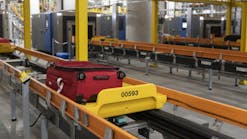Smooth Travels for Baggage at Sydney’s New Airport
A safe, reliable and smooth journey for bags as well as passengers will be the focus as Western Sydney Airport looks to award the contract for the design, construction and operation of the airport’s baggage handling system.
Western Sydney Airport Interim Chief Executive Officer Jim Tragotsalos said the baggage handling system would play a vital role in Western Sydney International (Nancy-Bird Walton) Airport’s operation.
“We are committed to delivering an airport that passengers love using – a seamless, easy and reliable experience – and baggage plays an important part in that,” Tragotsalos said.
“Too many of us know the stress of having a bag go missing in transit and our goal is to make sure that using the latest industry-leading technology at Sydney’s new airport, missing baggage becomes a thing of the past.
“Building an airport from the ground up means we can take advantage of world’s best practice when it comes to designing processes such as baggage handling and the technology behind them, to offer an optimal customer experience.
“We’re focused on ensuring we provide a convenient baggage handling service that gives passengers the confidence that their luggage is in safe hands and will arrive at the right place at the right time.
“Our goal is to design and construct an innovative and flexible system that focuses on worker safety, as well as reducing passenger waiting times, that can be easily expanded and keep up with emerging technology as the airport grows into the future.”
Following an open registration of interest phase, Western Sydney Airport has shortlisted four organizations for the work:
- Beumer Group Australia Pty Limited
- BCS Airport Systems Pty Limited
- Vanderlande Industries Australia Pty Ltd
- Siemens Logistics GmbH and Glidepath Australia Pty Ltd
The contract is expected to be awarded later this year.
Western Sydney International will open to international, domestic and air cargo flights in 2026, designed to cater for up to 10 million passengers a year.
Designed to grow in stages, it will eventually cater for more than 80 million passengers a year by the 2060s.


